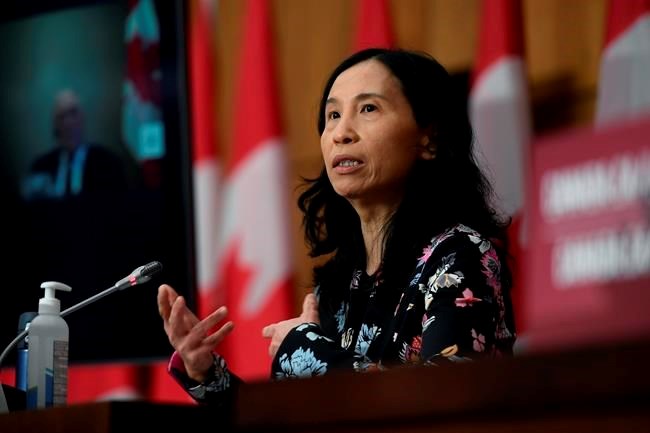OTTAWA — Canada's chief public health officer says the world must erect better defences against transmissible viruses as climate change and other factors raise the risk we will see more emerging infectious diseases in the years to come.
Dr. Theresa Tam's comments come as Canada has now confirmed 77 cases of monkeypox, with 71 in Quebec, five in Ontario and one in Alberta.
Globally, there are at least 550 confirmed cases in 30 non-endemic countries where the virus has not usually been found. It is the largest outbreak ever outside West and Central Africa, where it is endemic now in at least 10 countries.
The World Health Organization has not pinpointed where this current outbreak began, but WHO director general Tedros Adhanom Ghebreyesus said Wednesday "the sudden appearance of monkeypox in many countries at the same time suggests there may have been undetected transmission for some time."
Tam said the cases in Canada currently involve a specific group of individuals that have close, intimate sexual contact, but that could change.
“At the moment it hasn’t gone much beyond the initial risk groups, but it could happen and we need to be ready for that,” she said.
Public health officials have said while everyone is susceptible to the virus, clusters of cases have been reported among men who have sex with men.
Tam’s deputy, Dr. Howard Njoo, has said he's mindful of the potential for stigma and discrimination and emphasized that the virus's spread isn't limited to any specific group.
Tam said from a broader perspective, Canada and the rest of the world need to be better equipped when outbreaks like this occur.
"Emerging infectious disease can always hit us," she said. "And we should be as prepared as we can, which means reinforcing the global public health capacity."
Tam said improving capacity in every country "is really important" because with climate change and other factors there is more human and animal interaction, which is often how animal-borne viruses turn into human pandemics.
"I think we'll see an increase in numbers of these types of emerging infectious diseases, and with good capacity, not just in Canada, but globally we can help to manage them and reduce their impact as much as possible," Tam said.
The first non-endemic cases of monkeypox were confirmed in the United Kingdom in early May. The first cases were confirmed in Canada May 19.
African scientists and doctors are weary about the sudden interest in monkeypox as it infects western countries, which largely have ignored the virus as it spread around parts of Africa.
Tam on Friday called it a "neglected tropical disease."
"We need to have better international collaboration and support in order to collectively learn together globally," she said.
Monkeypox got its name because it was first found in monkeys in a laboratory in Denmark in 1958, but in the wild it is found mainly in small rodents such as rats, squirrels and shrews.
A global population exhausted following two years of the COVID-19 pandemic view the arrival of monkeypox with alarm and fear, though the virus does not spread through the air like the one that causes COVID-19 does.
Instead, the monkeypox virus spreads mainly through close contact with the virus on other humans or objects such as bed linens. While it can be fatal, it is most often not, causing symptoms such as fever, headache and muscle aches, and pox-like lesions on the skin.
It can take one to two weeks for an infected person to show symptoms, and Tam warned that while we know a lot about how the monkeypox virus behaves in countries where it is endemic, we know little about how it may behave in populations that are both mostly unvaccinated against it and have no natural levels of immunity.
A vaccine created for smallpox is also approved for use against monkeypox and Canada has a supply of the vaccine. Some doses were already sent to Quebec to vaccine close contacts of known cases, and Tam said conversations with every province are ongoing to determine whether some should be "prepositioned" all over the country.
She said contact tracing is proving difficult and while there is no expectation of a wide-scale public vaccination campaign for monkeypox, the existing campaign may be expanded to try and bring the outbreak in Canada to a close.
This report by The Canadian Press was first published June 3, 2022.
Mia Rabson, The Canadian Press

